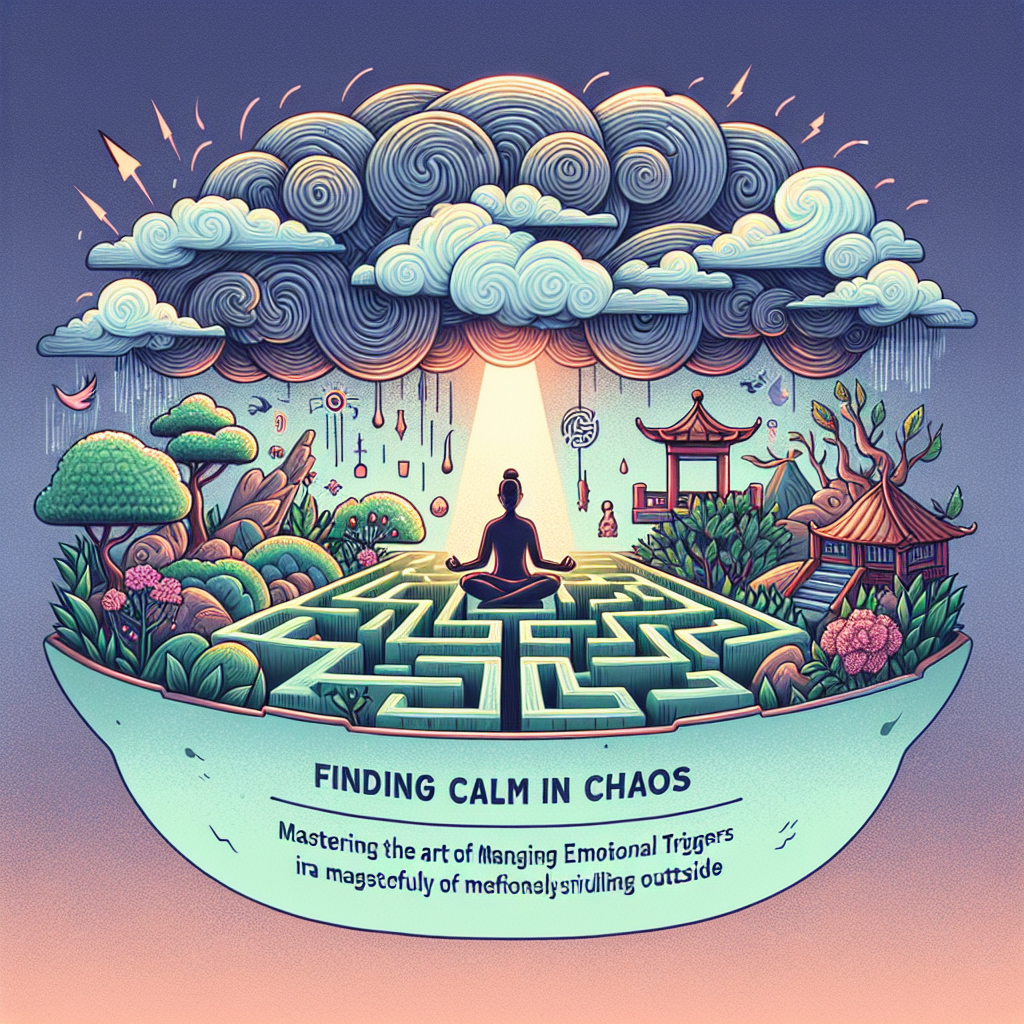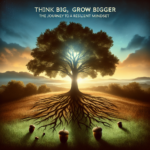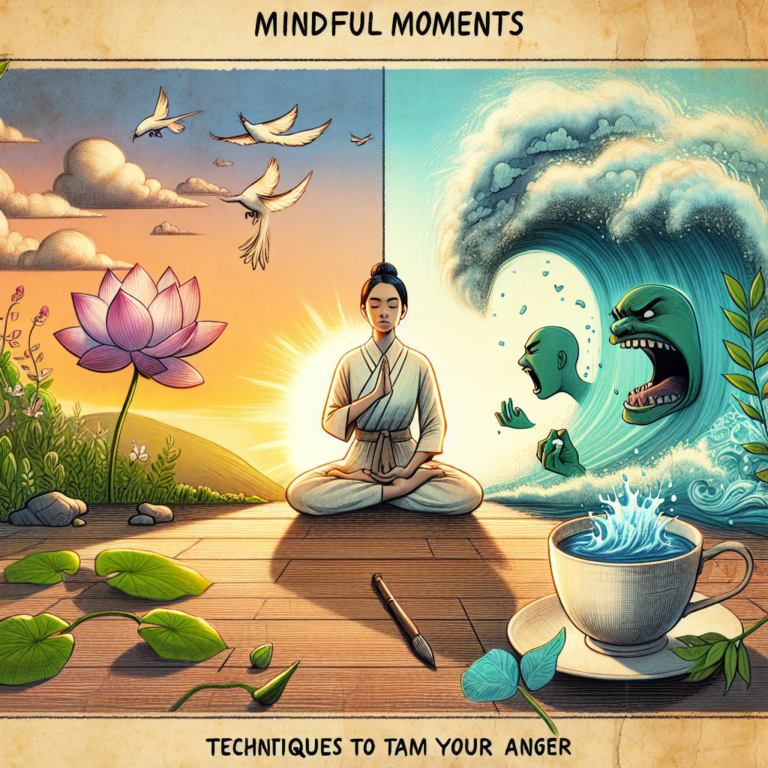
Finding Calm in Chaos: Mastering the Art of Managing Emotional Triggers
Introduction
In today’s fast-paced world, chaos seems to be a constant companion. From overwhelming workloads to personal crises, emotional triggers can shoot up unexpectedly, leaving us feeling disoriented and reactive. Finding Calm in Chaos: Mastering the Art of Managing Emotional Triggers isn’t just a lofty ambition—it’s an essential skill that can lead to healthier relationships, improved mental well-being, and a more satisfying life.
Imagine navigating your day with resilience and tranquility, even when faced with stressors. This article will delve into unique insights and practical strategies, empowering you to cultivate calm amidst the storm. Whether you’re dealing with anxiety, frustration, or simply the chaos of daily life, mastering emotional triggers can be transformative.
Understanding Emotional Triggers
What Are Emotional Triggers?
Emotional triggers are stimuli—whether people, situations, or internal cues—that provoke strong emotional reactions. These triggers often stem from past experiences, unresolved conflicts, or heightened sensitivities. By identifying and understanding these triggers, you can gain control over your emotions and responses.
| Trigger | Description | Example |
|---|---|---|
| Stressful Environment | Situations with high-pressure demands | Tight deadlines at work |
| Personal Relationships | Conflicts with loved ones | Disagreements with partners |
| Past Experiences | Memories reactivated by current events | A loud noise reminding you of a traumatic event |
Why Do Emotional Triggers Matter?
Recognizing emotional triggers is crucial for personal growth and emotional intelligence. An unmanaged trigger can spiral into anxiety, anger, or sadness, impacting not just your well-being but also your relationships. By mastering your emotional responses, you set the stage for healthier interactions and enhanced life satisfaction.
Strategies for Finding Calm in Chaos
1. Self-Awareness and Mindfulness
The journey begins with self-awareness. When you understand your emotional triggers, you empower yourself to respond rather than react. Mindfulness practices—such as meditation, deep breathing, and body scans—can help you cultivate this awareness.
Case Study: Emma’s Journey to Mindfulness
Emma found herself losing her temper over minor issues at work. After exploring mindfulness, she began practicing daily meditation. Over time, Emma discovered that her irritability stemmed from feeling overloaded. Adopting a mindfulness approach enabled her to pause and assess situations before reacting.
2. Identify Your Triggers
Tracking your emotional responses can reveal patterns in your behavior. Maintain a journal to document instances when you feel triggered. Include details about the situation and your emotional response.
| Date | Trigger | Emotional Response | Coping Strategy |
|---|---|---|---|
| 2023-10-01 | Disagreement at work | Frustration | Breathe deeply, took a break |
| 2023-10-02 | An unexpected critique | Insecurity | Reframed feedback positively |
3. Develop Coping Strategies
Once you’ve identified your triggers, it’s time to create tailored coping strategies. Here are some proven techniques:
Deep Breathing Exercises
Engage in deep breathing anytime you feel the tension rising. Inhale slowly for a count of four, hold for four, and exhale for four. This simple practice can ground you and reduce anxiety.
Positive Affirmations
Reinforce a positive mindset by creating affirmations that counteract negative thoughts associated with your triggers. Say them aloud or write them down.
4. Create a Support System
Having a trusted network can make navigating emotional turbulence easier. Friends, family, or therapists can provide a listening ear, helping you process your experiences.
Case Study: Tim’s Support Network
Tim often felt overwhelmed by workplace stress. By opening up to close friends, he discovered they were experiencing similar challenges. They formed a support group, allowing them to share coping techniques and emotional experiences, fostering a sense of connection and relief.
5. Explore Professional Help
If your emotional triggers feel unmanageable, seeking professional help can provide invaluable support. Therapists, counselors, or life coaches can offer personalized strategies to navigate your emotional landscape.
Finding Calm through Self-Care
The Power of Routine
Incorporating self-care into your daily routine can fortify your emotional resilience. Allocate time for activities that rejuvenate you—whether it’s exercising, reading, or simply relaxing.
Digital Detox
Limit your screen time to alleviate stress. Social media can become an emotional trigger, amplifying feelings of inadequacy or anxiety. Designate tech-free times during your day.
Conclusion
Finding Calm in Chaos: Mastering the Art of Managing Emotional Triggers is a skill that demands practice and dedication. By understanding your triggers and implementing effective coping strategies, you pave the way for emotional serenity. Remember, it’s a journey—one filled with ups and downs—but with determination, tranquility is within reach.
Takeaway
Each individual holds the power to transform their emotional responses. Embrace mindfulness, identify your triggers, and cultivate a supportive environment. In doing so, you can emerge not just as a survivor of chaos but as a master of emotional calm.
FAQs
1. What are common emotional triggers?
Common triggers include stressors from work, personal relationships, past trauma, and environmental factors.
2. How can I identify my emotional triggers?
You can maintain a journal, reflecting on your feelings and situations that provoke strong emotional reactions.
3. What coping strategies are most effective?
Techniques such as deep breathing, positive affirmations, and talking to a trusted friend are effective coping strategies.
4. When should I seek professional help?
If your emotional triggers consistently impede your daily life or relationships, professional help may provide essential support.
5. Is mindfulness the only way to manage emotional triggers?
While mindfulness is effective, other strategies, such as developing coping methods and establishing a support system, are also valuable.
By embracing these insights and applying them diligently, you can successfully navigate the tumult of life and cultivate a state of calm that allows you to thrive. Transforming chaos into tranquility is not just a possibility but an attainable reality.















